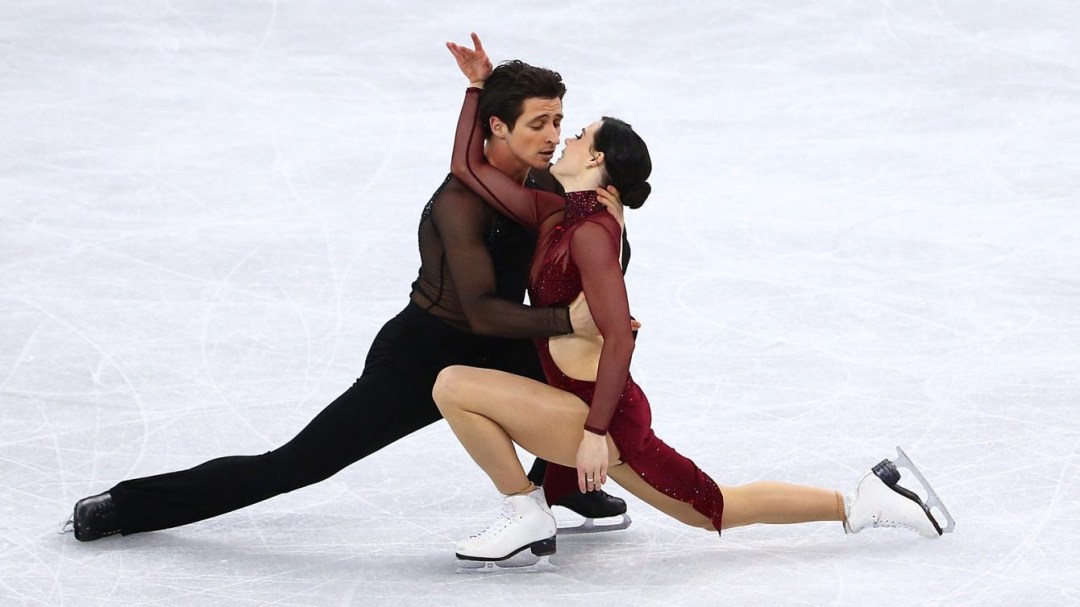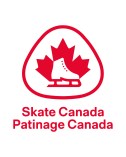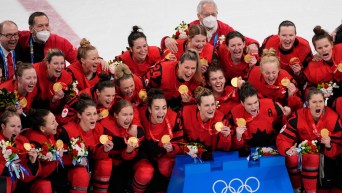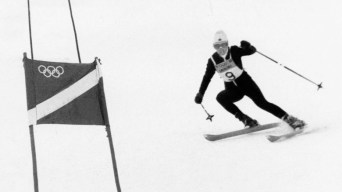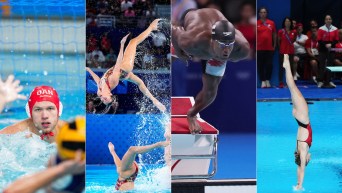Figure Skating
Team Canada Medal Count
Sport Overview
Figure Skating at Milano Cortina 2026
Venue: Milano Ice Skating Arena
Competition Dates: February 6-11, 13, 15-17, 19 (Days 0-5, 7, 9-11, 13)
Events: 5 (1 men, 1 women, 3 mixed)
| Men’s Events | Women’s Events | Mixed Events |
|---|---|---|
| Men’s Singles | Women’s Singles | Pairs Ice Dance Team Event |
There are four figure skating disciplines: men’s singles, women’s singles, pairs, and ice dance. In each discipline, the skaters perform two routines—a short program/rhythm dance and a free skate/free dance. There is also a team event which brings together all four disciplines.
Men’s and Women’s Singles
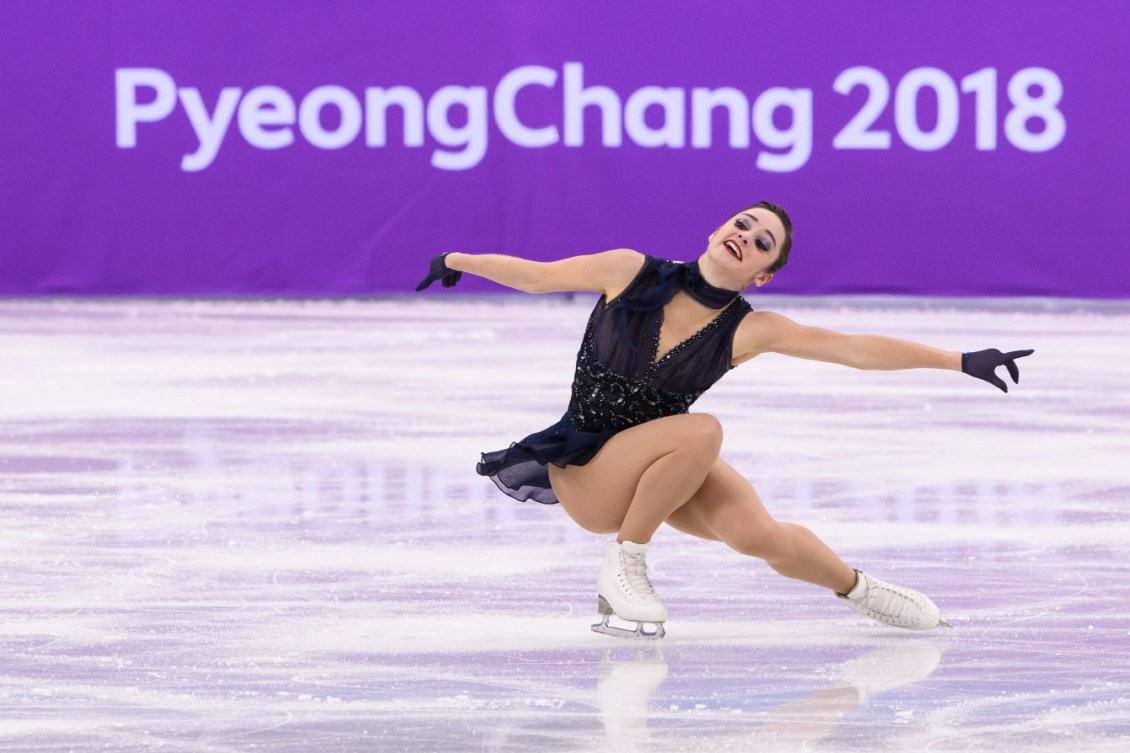
Both singles short programs are two minutes and 40 seconds in length (plus or minus 10 seconds) and include seven elements: three jumping passes (including one combination), three spins, and one step sequence.
The men’s and women’s free skates are four minutes in length (plus or minus 10 seconds) and feature 12 elements: seven jumping passes (including three combinations or sequences), three spins, one step sequence, and one choreographic sequence. At the Olympic Games, only the top 24 singles skaters from the short programs advance to the free skates.
Pairs
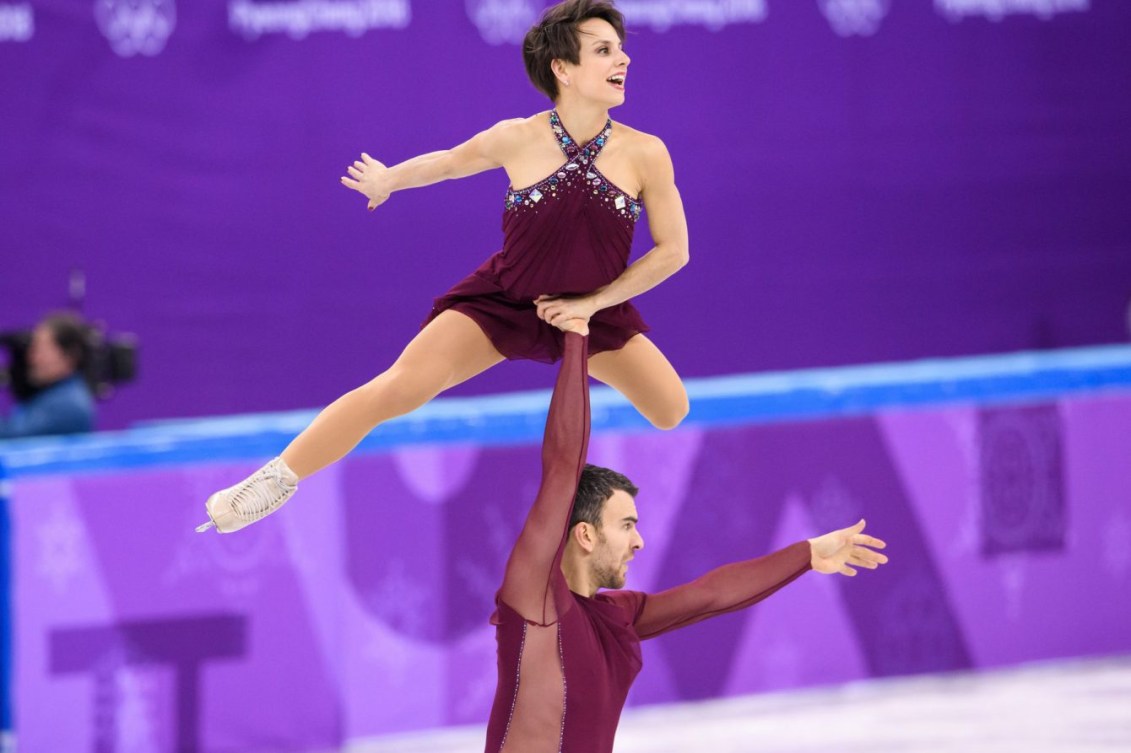
The pairs’ short program is also two minutes and 40 seconds (plus or minus ten seconds) and includes seven elements: one lift, one twist lift, one throw, one solo jump (performed side-by-side), one spin, one death spiral, and one step sequence.
Only the top 16 pairs from the short program advance to the free skate, which is four minutes (plus or minus 10 seconds) and includes 11 elements: three lifts, one twist lift, two throws, one solo jump, one solo jump combination or sequence, one spin, one death spiral, and one choreographic sequence.
Ice Dance
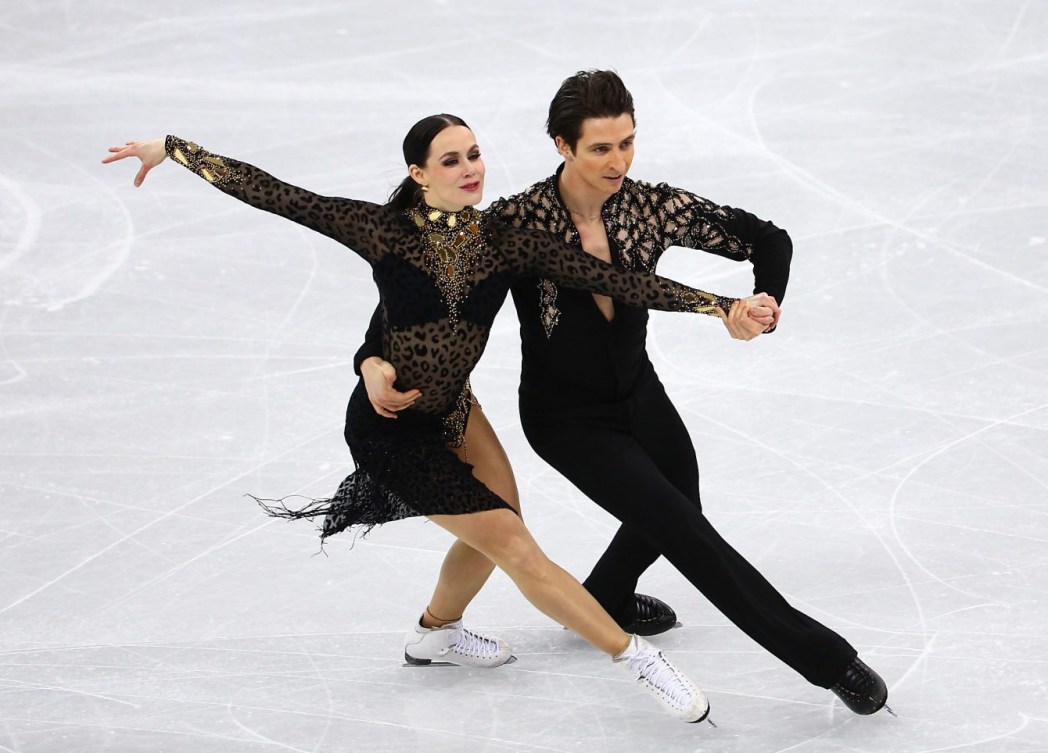
In ice dance, the rhythm dance must be created and performed in the assigned theme and/or rhythms for the season and include portions of a compulsory pattern. The two minute and 50 second (plus or minus 10 seconds) program must also include one twizzle sequence, one lift, one step sequence, and other choreographic elements as prescribed each season.
Only the top 20 couples from the rhythm dance advance to the free dance, which is four minutes (plus or minus 10 seconds). It features a mix of elements judged for difficulty and execution (twizzle sequence, two or three dance lifts, dance spin, two step sequences) as well some choreographic elements evaluated solely for style and execution.
Team Event
The team event includes 10 countries, each putting forward one man, one woman, one pair and one ice dance couple. The top five teams after the short programs advance to the free skates. Team standings are decided on aggregate placement points for each skater/couple, ie: first place earns 10 points, second place earns nine points down to 10th place earning one point.
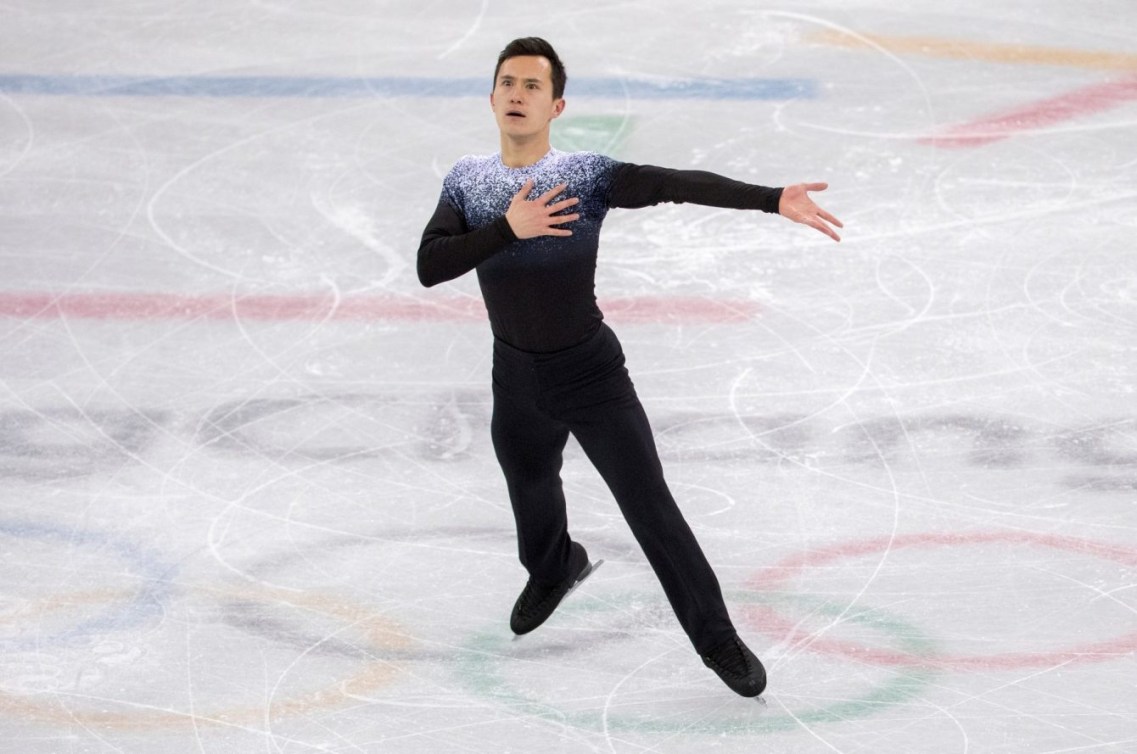
Scoring
For each program, skaters receive two sets of scores: the Technical Elements Score (TES) and the Program Components Score (PCS). The TES is based on each element performed (jumps, spins, footwork, lifts, etc.) having a set point value which can increase or decrease depending on how it is executed. The PCS evaluates the program as a whole and is divided into three areas (skating skills, presentation, composition) with each scored on a scale of 0.25 to 10.
The TES and PCS are calculated by discarding the highest and lowest scores from the nine judges for each element/component and averaging the rest. Added together, the TES and PCS produce the Total Segment Score (TSS) for a program. The sum of the TSS for the short program/rhythm dance and free skate/free dance determines the final results.
Canadian Olympic Figure Skating History (pre-Milano Cortina 2026)
With 29 Olympic medals, Canada is one of the traditional global powerhouses in figure skating.
There were four medals won at PyeongChang 2018, highlighted by a gold medal in the team event by Patrick Chan, Kaetlyn Osmond, Gabrielle Daleman, Meagan Duhamel & Eric Radford, and Tessa Virtue & Scott Moir. Virtue and Moir also won gold in the ice dance event, giving them five Olympic medals in their careers to become the most decorated figure skaters in Olympic history. Duhamel and Radford added bronze in the pairs event while Osmond won bronze in the women’s event.
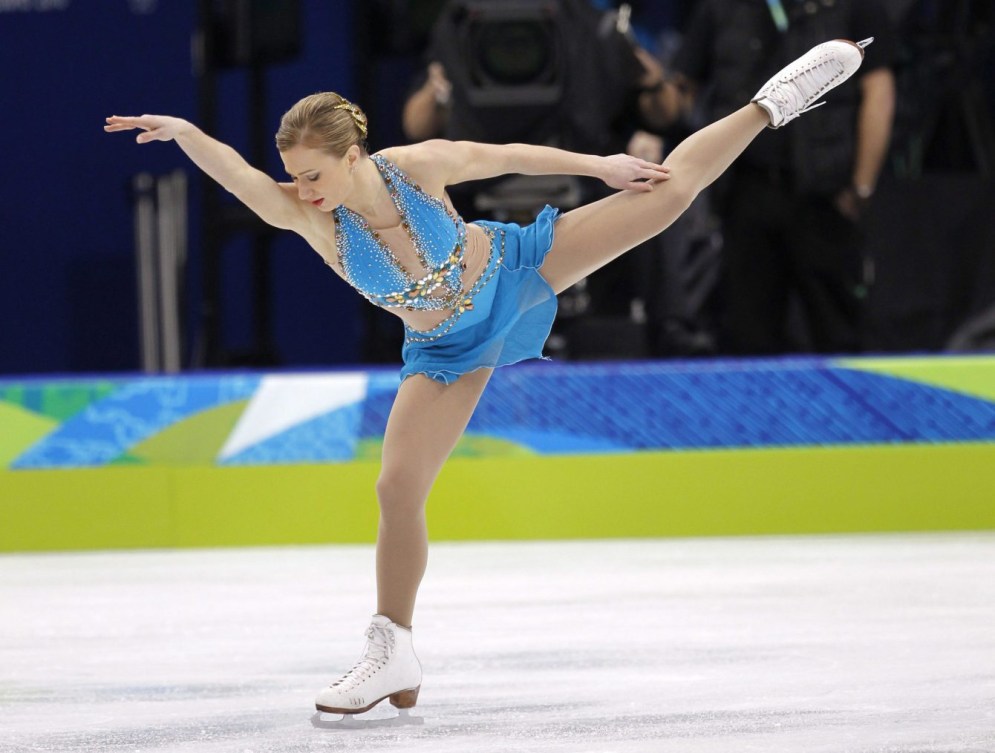
Three medals had been won at Sochi 2014 where Canada captured silver in the inaugural Olympic team event. Silver medals were also won by Chan in the men’s event and ice dancers Virtue and Moir. Four years earlier at Vancouver 2010, Virtue and Moir had won gold, the first Canadian ice dancers to become Olympic champions. It was also in Vancouver that Joannie Rochette won bronze in front of a supportive home crowd just days after the tragic passing of her mother.
The home Games at Calgary 1988 were also great for Canadian figure skating. In the “Battle of the Brians” against American Brian Boitano, Brian Orser won his second straight Olympic silver medal. Elizabeth Manley surprised with a silver in the women’s event while Tracy Wilson and Rob McCall became Canada’s first Olympic ice dance medallists with their bronze.
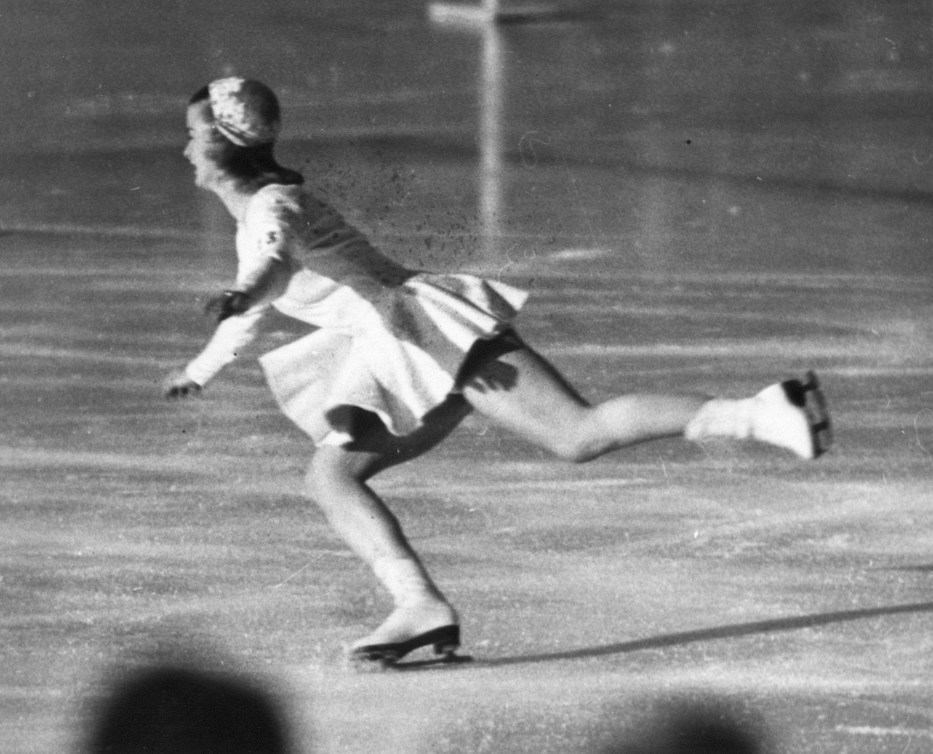
The first Canadian figure skater to win Olympic gold was Barbara Ann Scott at St. Moritz 1948. Canada’s next two Olympic gold medals were won in pairs, by Barbara Wagner and Robert Paul at Squaw Valley 1960 and more than four decades later by Jamie Sale and David Pelletier at Salt Lake City 2002.
Other Canadian multi-medallists include Elvis Stojko, who won back-to-back silver medals at Lillehammer 1994 and Nagano 1998, and Isabelle Brasseur and Lloyd Eisler who were on the pairs’ podium at Albertville 1992 and Lillehammer 1994.
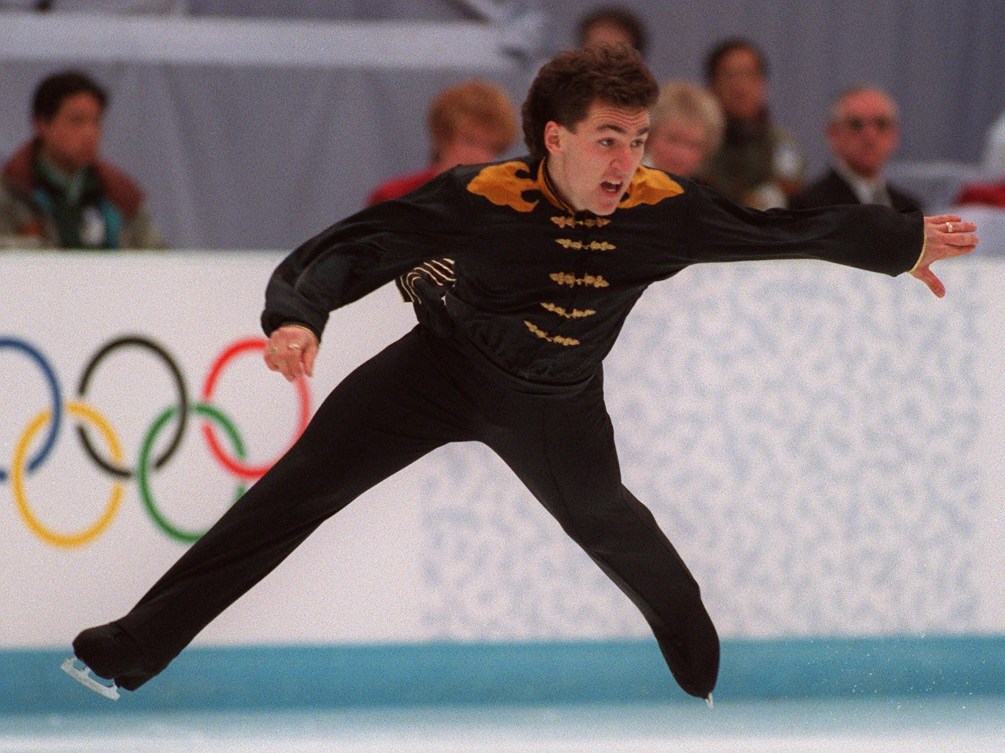
Canada’s first Olympic figure skating medal was a bronze in men’s singles at Lake Placid 1932 by Montgomery Wilson.
Olympic Figure Skating History
Figure skating was included at two Olympic Summer Games—London 1908 and Antwerp 1920—before the Olympic Winter Games came into existence in 1924. It has since been featured in every edition of the Olympic Winter Games.
From the beginning, there have been men’s and women’s singles events as well as a pairs event. Ice dance was added to the Olympic program at Innsbruck 1976. The team event was first included at Sochi 2014.
In the early days, singles skaters performed a set of compulsory figures followed by a free skate. The short program was added for the 1973 World Championships and figures were last included at the 1990 World Championships.
Similarly, ice dance featured compulsory dances and a free dance before a third phase, the original set pattern (later called the original dance), was added at the 1983 World Championships. Compulsory dances were removed from competition after the 2009-10 season and, instead, assigned patterns were to be integrated into what is now the rhythm dance.
Canadian Medallists
| Event | Athlete | Finish | Games |
|---|---|---|---|
| Women | Barbara Ann Scott | Gold | St. Moritz 1948 |
| Pairs | Barbara Wagner, Robert Paul | Gold | Squaw Valley 1960 |
| Pairs | Jamie Salé, David Pelletier | Gold | Salt Lake City 2002 |
| Ice Dance | Tessa Virtue, Scott Moir | Gold | Vancouver 2010 |
| Team | Patrick Chan, Gabrielle Daleman, Kaetlyn Osmond, Meagan Duhamel, Eric Radford, Tessa Virtue, Scott Moir | Gold | PyeongChang 2018 |
| Ice Dance | Tessa Virtue, Scott Moir | Gold | PyeongChang 2018 |
| Pairs | Frances Dafoe , Norris Bowden | Silver | Cortina d'Ampezzo 1956 |
| Pairs | Debbi Wilkes, Guy Revell | Silver | Innsbruck 1964 |
| Women | Karen Magnussen | Silver | Sapporo 1972 |
| Men | Brian Orser | Silver | Sarajevo 1984 |
| Men | Brian Orser | Silver | Calgary 1988 |
| Women | Elizabeth Manley | Silver | Calgary 1988 |
| Men | Elvis Stojko | Silver | Lillehammer 1994 |
| Men | Elvis Stojko | Silver | Nagano 1998 |
| Team | Patrick Chan, Kevin Reynolds, Kaetlyn Osmond, Tessa Virtue, Scott Moir, Kirsten Moore-Towers, Dylan Moscovitch, Meagan Duhamel, Eric Radford | Silver | Sochi 2014 |
| Men | Patrick Chan | Silver | Sochi 2014 |
| Ice Dance | Tessa Virtue, Scott Moir | Silver | Sochi 2014 |
| Men | Montgomery Wilson | Bronze | Lake Placid 1932 |
| Pairs | Suzanne Morrow, Wallace Diestelmeyer | Bronze | St. Moritz 1948 |
| Men | Donald Jackson | Bronze | Squaw Valley 1960 |
| Women | Petra Burka | Bronze | Innsbruck 1964 |
| Men | Toller Cranston | Bronze | Innsbruck 1976 |
| Ice Dance | Tracy Wilson, Rob McCall | Bronze | Calgary 1988 |
| Pairs | Isabelle Brasseur, Lloyd Eisler | Bronze | Albertville 1992 |
| Pairs | Isabelle Brasseur, Lloyd Eisler | Bronze | Lillehammer 1994 |
| Men | Jeffrey Buttle | Bronze | Turin 2006 |
| Women | Joannie Rochette | Bronze | Vancouver 2010 |
| Pairs | Meagan Duhamel, Eric Radford | Bronze | PyeongChang 2018 |
| Women | Kaetlyn Osmond | Bronze | PyeongChang 2018 |

